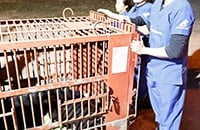The Animal Welfare Review - June
07 July 2015

The animal welfare stories you need to know from around the world in June.
The New Zealand government has amended laws to recognise animals as “sentient” beings. As per amendments to the country’s animal welfare legislations, owners will have to “attend properly to the welfare of those animals” including using non-sentient/non-living alternatives where possible for research purposes. The law in Germany, Switzerland and France views animals similarly. [The Independent]
A man was killed by an elephant that escaped from a circus in Germany. The 34-year-old elephant attacked the man while he was out on an early morning walk. It is not known why the elephant attacked or how he escaped. Animals Asia’s No Voice No Choice campaign is currently seeking an end to the use of animals in entertainment globally. [The Daily Mail]
Thirteen moon bears were rescued from 10 locations in Vietnam as part of a four-day rescue operation conducted by Animals Asia. The rescue led to the closure of six bile farms. The bears have been safely transported to Animals Asia’s Vietnam Bear Rescue Centre, where they will be cared for and rehabilitated. While local authorities have mandated that every captive bear in the Quang Ninh province, where the rescues took place, is transferred to Animals Asia’s care by end of July, 17 bears still remain captive as authorities negotiate with bear owners over transfers. [Animals Asia]
Despite protests and opposition from a number of organisations, including Animals Asia, the 27 wild young elephants captured in Zimbabwe last year are set to head to a safari park in China. Chimelong Safari Park, located in Guangzhou, has long been the centre of controversy, hosting a TV show where animals were given pedicures and taken on shopping trips as well as housing the “largest circus in the world”. Inspections by Animals Asia has also found that many of the animals are housed in poor conditions. According to a local Chinese paper, the completion of a quarantine centre paves the way for their arrival, expected to be this month. [The Telegraph, Animals Asia]
The cat meat industry continues to boom in Vietnam despite being outlawed since 1998. Restaurants serving cat meat are flourishing according to an investigative report in The Post, thought to be a source of “strength and potency.” Most of the cats consumed are either stolen pets or illegally imported from neighbouring countries. [The Post]
Countries in the EU will continue to be allowed to use live animals for medical research. The decision, issued by the European Commission, comes in response to a campaign to stop laboratory experiments on animals. Nearly 12 million animals were used for experiments in the EU in 2011. [BBC]
A see-through microchip invented by researchers at Harvard might bode the end of animal testing once and for all. The microchips, still in testing phase, mimic the functioning of human organs, and will allow researchers to test medical and cosmetic products without the use of lab animals. [The Christian Science Monitor]
After 32 years in captivity, a female orca Freya has died at Marineland, a theme park located in Antibes, France. Freya was caught at just a year old, one of seven Icelandic orcas in captivity around the world. Orca's are believed to live for anything up to 80 years in the wild. [Inquisitr]
BACK






 5 reasons the dog meat trade must end
5 reasons the dog meat trade must end
 New year, new home for Christmas the Bear!
New year, new home for Christmas the Bear!
 Veterinary welfare training – pain management
Veterinary welfare training – pain management